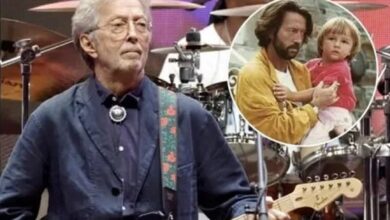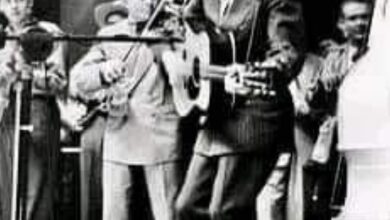Keith Whitley’s “When You Say Nothing at All” Redefines Country Intimacy in 1988
When Keith Whitley released “When You Say Nothing at All” in 1988, it quietly became one of the most emotionally resonant ballads in modern country music history. Written by esteemed Nashville songwriters Don Schlitz and Paul Overstreet, the track captured the beauty of silent understanding between lovers, elevating country songwriting to a new level of vulnerability and sincerity. It quickly climbed the Billboard Hot Country Singles chart, reaching No. 1 and holding that spot for two weeks. Beyond its commercial success, the song marked a watershed moment in the genre—where less became more, and subtlety carried more weight than spectacle.
Keith Whitley’s rise to stardom was rooted in a deep connection to traditional country music. Born in Sandy Hook, Kentucky in 1955, he was heavily influenced by bluegrass and honky-tonk from a young age. He began performing with Ralph Stanley at just 17 and brought a mournful, aching quality to his vocals that would define his sound. Unlike many of his contemporaries, Whitley didn’t rely on polished theatrics—he sang like a man who’d lived the pain in every lyric. That honesty became his trademark and helped him carve out a loyal following in a short span of time.
The origin of “When You Say Nothing at All” is steeped in songwriter magic. Don Schlitz and Paul Overstreet—both already successful hitmakers—reportedly stumbled into the concept during a writing session where nothing seemed to be working. Overstreet commented that “sometimes, you say it best when you say nothing at all,” and Schlitz immediately realized they had a title. What followed was a lyrical meditation on the nonverbal expressions of love—how looks and silence can communicate deeper truths than words ever could. Whitley, upon hearing the demo, connected to it instantly.
The recording process for the song was simple but meticulous. Produced by Garth Fundis, the session emphasized restraint and atmosphere. The arrangement was sparse—anchored by gentle acoustic guitar, soft steel guitar lines, and minimal percussion that allowed Whitley’s voice to float in the foreground. His delivery was tender and unhurried, breathing life into every phrase. Rather than embellishing the melody, he leaned into its stillness, giving listeners space to feel each word’s weight.
Critics and fans embraced the single immediately. Released as the second single from Whitley’s Don’t Close Your Eyes album, “When You Say Nothing at All” debuted in the spring of 1988 and quickly became one of the most requested songs on country radio. Its understated power stood in stark contrast to the louder, more upbeat tracks dominating the airwaves. The song helped the album go gold, and Whitley’s reputation as one of Nashville’s most emotionally compelling vocalists soared.
The cultural impact of the track was significant. At a time when country music was flirting heavily with pop crossovers and synthesizer-heavy arrangements, Whitley’s approach felt like a return to roots—but updated with a modern sensibility. It influenced countless artists to embrace quiet vulnerability in their songwriting and performance. The song also helped cement the credibility of songwriter-driven country—songs born from deeply human experiences rather than radio formulas.
Career-wise, the song was a turning point for Whitley. He went from rising star to genre leader, hailed by critics as the heir apparent to George Jones. His ability to evoke heartbreak with such subtlety set him apart in a crowded field. The success of “When You Say Nothing at All” paved the way for more introspective singles like “I’m No Stranger to the Rain” and “I Wonder Do You Think of Me,” each continuing the emotional arc first laid down by this ballad.
The track’s influence extended well beyond Whitley’s own catalog. It served as a guiding light for the ‘90s neo-traditionalist movement, inspiring artists like Randy Travis, Alan Jackson, and Vince Gill to embrace simplicity and soul in their music. It also helped reshape audience expectations—making room for quieter, more personal songs alongside stadium-ready anthems. The idea that a whisper could resonate louder than a shout became a cornerstone of the decade’s country sound.
One of the most notable renditions of the song came after Whitley’s tragic passing. In 1994, Irish singer-songwriter Ronan Keating recorded a cover for the Notting Hill film soundtrack. His version, while more polished and pop-driven, introduced the song to a global audience and hit No. 1 in the UK and Ireland. It demonstrated the song’s timeless appeal and proved that its message of unspoken love transcended cultural boundaries.
Tragically, Whitley died just a year after the song’s release, in May 1989, at the age of 34 from alcohol poisoning. His death stunned the music world and froze his meteoric rise in place. In many ways, “When You Say Nothing at All” became his legacy—an eternal reminder of what he brought to country music in just a few short years. It was the last major single released during his lifetime, making its message all the more poignant in hindsight.
The song’s legacy continues through constant radio rotation and its placement on nearly every list of country’s greatest ballads. It remains a staple at weddings, memorials, and quiet moments of reflection. Whitley’s version is still considered definitive—its emotional purity untouched by time or imitation. The track helped shape a generation of balladeers who learned that sometimes restraint is more powerful than range.
In terms of long-term influence, “When You Say Nothing at All” redefined how emotion could be conveyed in country music. It set a precedent for storytelling that wasn’t dependent on big narratives but rather on nuance. In the years that followed, many artists adopted its quiet strength as a template, allowing space for listeners to feel rather than be told.
In the decades since, Whitley has been honored with posthumous accolades, including inductions into the Country Music Hall of Fame and praise from nearly every modern country artist worth their salt. Many cite “When You Say Nothing at All” as a masterclass in delivery—a reminder that the best performances aren’t always the loudest.
Ultimately, the song’s importance lies in its intimacy. It doesn’t demand attention; it earns it. It remains a shining example of how country music can elevate the simplest moments into lifelong memories. Whitley may be gone, but with this song, he left behind something lasting—proof that silence, when wrapped in love, can speak louder than words.



